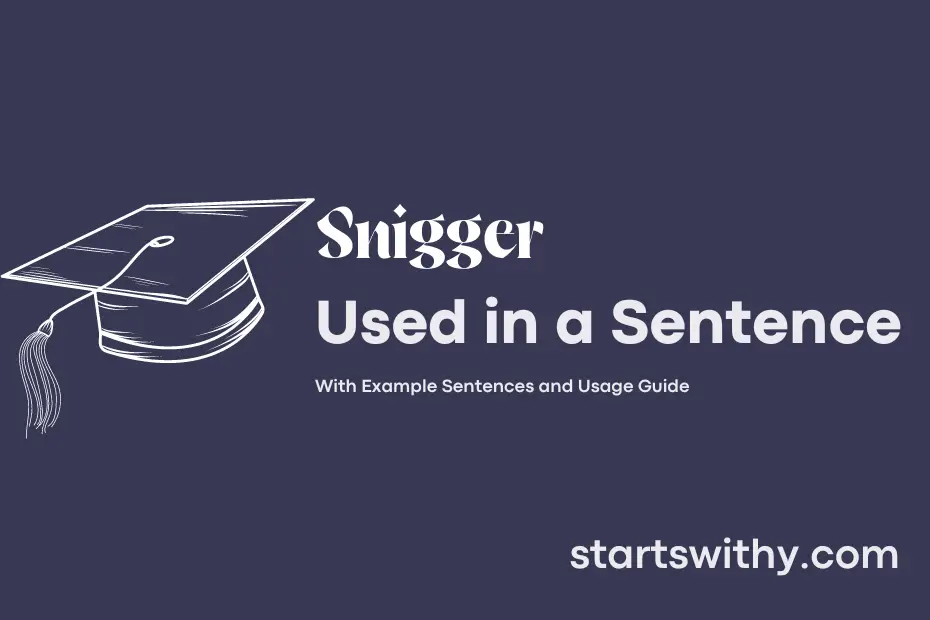Do you know what it means when someone sniggers? The term “snigger” refers to a smug or disrespectful laugh, often characterized by a snorting sound.
It is a subtle way of showing amusement or contempt, typically done in a sneaky or mocking manner. The act of sniggering can be perceived as rude or disrespectful, depending on the context in which it is used.
7 Examples Of Snigger Used In a Sentence For Kids
- Arya tried to hide her snigger when her friend made a funny face.
- The little boy couldn’t help but snigger when he heard a silly joke.
- During the storytime, the children would snigger at the funny voices the teacher used.
- Riya’s face lit up with a snigger as she saw her favorite cartoon character on TV.
- In the play area, the kids would often snigger when someone fell down while playing.
- During the puppet show, the children would snigger at the funny antics of the puppets.
- When the teacher made a silly face, the whole class would burst into sniggers.
14 Sentences with Snigger Examples
- Sniggering at someone’s mistake during a class presentation is disrespectful.
- It’s important to remember that sniggering at someone’s accent is never okay.
- Students shouldn’t snigger at others for asking questions in class; it’s important to create a supportive learning environment.
- Sniggering at a peer’s performance in a play is unkind and unnecessary.
- It’s best to avoid sniggering at someone’s outfit choices; everyone has their own unique style.
- Sniggering at someone’s beliefs or opinions shows a lack of respect for diversity.
- It’s important to confront friends who snigger at others, as it perpetuates a culture of negativity.
- Sniggering at a professor’s lecture may be seen as disrespectful and can harm the classroom environment.
- Sniggering in a group can make others feel excluded and uncomfortable.
- College students should be mindful of their behavior and avoid sniggering at others, as it can contribute to a toxic atmosphere.
- Sniggering during a group study session can be distracting and hurtful to others trying to focus.
- It’s crucial to address any instances of sniggering within friend groups to promote a more positive and inclusive environment.
- Sniggering at someone’s mispronunciation of a word can be hurtful and discouraging.
- College students should aim to build each other up, not snigger at each other’s shortcomings.
How To Use Snigger in Sentences?
Snigger is used to express a quiet or suppressed laugh or giggle. To include “snigger” in a sentence, follow these steps:
-
Choose the right context: Snigger is often used when someone finds something amusing but wants to keep their laughter quiet or discreet.
-
Select the appropriate moment: Use snigger when you witness something slightly funny or when you want to subtly express amusement without drawing attention.
-
Construct your sentence: Place the word “snigger” in a sentence where you would normally use “chuckle” or “giggle.” For example, “She couldn’t help but snigger at the movie’s clever joke.”
-
Ensure proper punctuation: Use a comma to separate the main sentence from the word “snigger.” For example, “Despite trying to stifle it, he let out a small snigger, giving away his amusement.”
-
Practice using it: To become more comfortable with using the word “snigger,” try incorporating it into your conversations or writing. This will help you become more natural in your usage.
Remember, “snigger” is a subtle way to express amusement, so use it in situations where a quiet chuckle or giggle is appropriate. Practicing its usage will help you become more confident in incorporating it into your vocabulary.
Conclusion
In various situations, people may snigger as a form of suppressed laughter or amusement. It can be a subtle way to express amusement without drawing too much attention. Sniggering is often seen in settings where laughter may not be appropriate, such as during a serious conversation or a formal event.
While sniggering may seem harmless, it is important to be mindful of the impact it may have on others. Some may find it disrespectful or offensive, especially if they perceive it as mocking or belittling. Being aware of the context and audience is essential to ensure that sniggering is used appropriately and considerately in social interactions.



